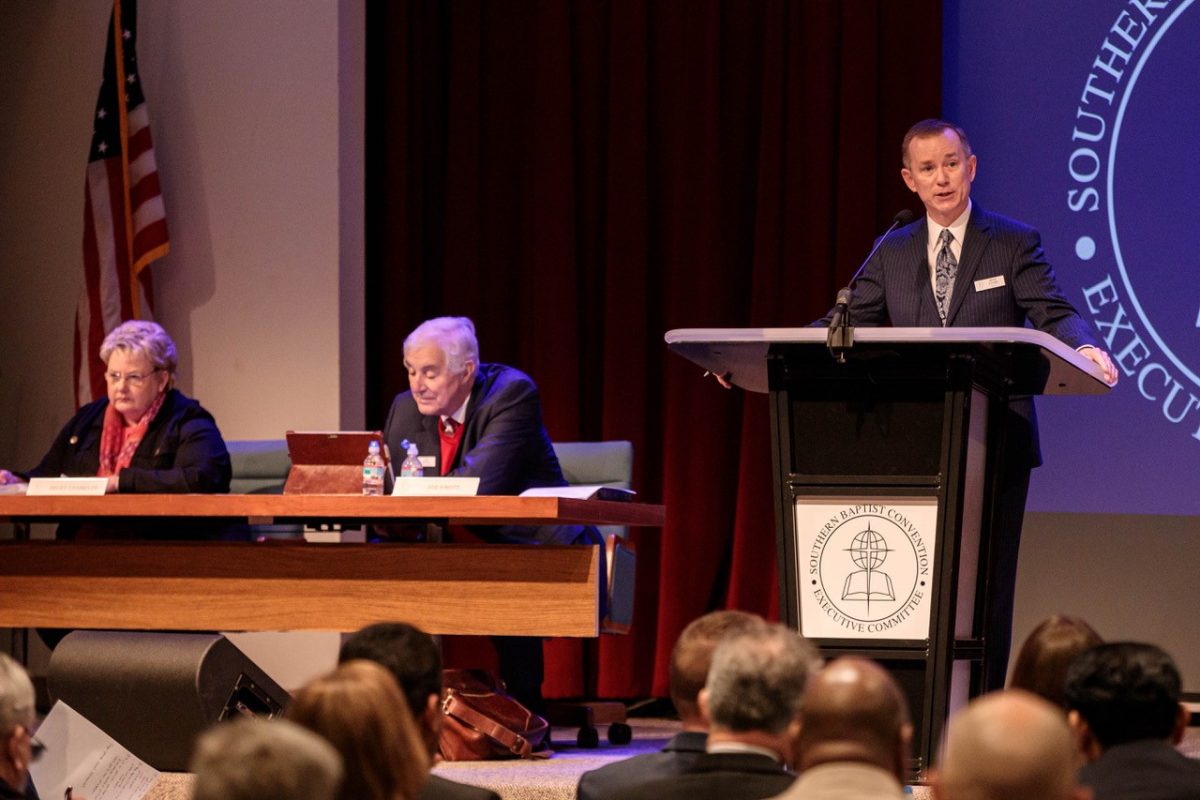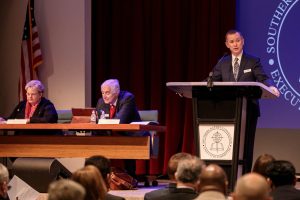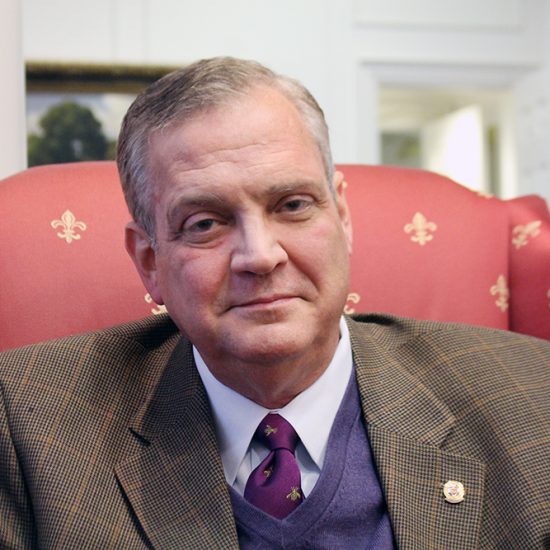
After 14 controversy-filled months as the only announced candidate for the next president of the Southern Baptist Convention, Al Mohler will face at least one challenger in the vote this June. On Wednesday (Jan. 13), a Baptist pastor from Georgia announced his candidacy to challenge Mohler, president of Southern Baptist Theological Seminary in Louisville, Kentucky.
Mike Stone, pastor of Emmanuel Baptist Church in Blackshear, Georgia, and immediate past chair of the SBC Executive Committee, immediately drew support from some in SBC life who have attacked Mohler for not being conservative enough, especially on issues of race. And Stone and his supporters argued the SBC needs a pastor — not a seminary head — to serve as president.

Mike Stone speaks at a Southern Baptist Convention Executive Committee meeting on Feb. 18, 2020. (Baptist Press)
“I truly feel the SBC will be best led by a pastor,” Stone told the SBC’s Baptist Press. “With deep gratitude for an entity leader’s influence, the SBC is a convention of churches and needs leadership that is daily in tune with the local church.”
Stone serves on the steering council of the Conservative Baptist Network, a group that launched in February 2020 to move the SBC further rightward. In addition to other pastors and educational leaders, steering council members include several Republican activists, including former Republican National Committee faith director Chad Connelly, former Arkansas Gov. Mike Huckabee, former U.S. Rep. Bob McEwen, and Family Research Council President Tony Perkins.
Stone said he called Mohler, who had criticized the CBN’s launch, before publicly announcing his own SBC presidential run.
On Nov. 1, 2019, Mohler announced he would run for SBC president in 2020 — an early announcement that some thought was designed to keep others from running. However, coronavirus led to the meeting’s cancellation in March. As a result, J.D. Greear remained president for another year, and the election for the next president was postponed until 2021.
In April, Mohler flipped from his 2016 opposition to Donald Trump and endorsed Trump’s reelection bid. Although most Southern Baptists backed Trump, Mohler’s move also upset some Black Southern Baptists.
Dwight McKissic, a Black Southern Baptist pastor in Texas who unsuccessfully pushed Mohler in 2020 to remove honors on SBTS’s campus to the school’s enslaver founders, compared Mohler’s support of Trump to Mohler’s honoring of enslavers.
“President Donald Trump supports the protection of honoring the legacy of White Supremacy by his adamant posture of honoring the names of Confederate soldiers on military bases, and statues and monuments that celebrate White Supremacists,” McKissic wrote in July. “Mohler is following President Trump’s example by the insistence of honoring White Supremacists on the campus of Southern Seminary.”
Then on Nov. 30, Mohler led the six Southern Baptist seminary presidents to condemn Critical Race Theory, a decades-old broad social science perspective that scholars use in analyzing issues of race, power, and society. Some leaders in the Conservative Baptist Network had previously criticized Mohler and SBTS for allegedly embracing CRT.
The press release announcing CBN’s creation claimed the reason for the group was to challenge “the apparent emphasis on social justice, Critical Race Theory, Intersectionality, and the redefining of biblical gender roles” within Southern Baptist life. The other key complaint listed to justify CBN’s creation was the unsuccessful effort by some SBC messengers to prevent Vice President Mike Pence from speaking to the SBC’s annual meeting in 2018.
CBN in September praised Trump for an executive order targeting CRT. Calling CRT a “divisive, anti-gospel ideology,” CBN’s statement added, “We call upon every Southern Baptist entity to denounce publicly — by statement and action — any and all support for Critical Race Theory.”
Almost three months later, Mohler and the other SBC seminary presidents did so. But their condemnation of CRT sparked controversy, especially as many people found it troubling that six Anglo men made the declaration without consulting with African Americans. Leaders of the SBC’s National African American Fellowship criticized the statement. And Black Southern Baptist pastors from Minnesota to Illinois to Kentucky to Texas and elsewhere said they were leaving the SBC after the anti-CRT move.
Then following the pro-Trump mob attacking the U.S. Capitol on Jan. 6, Mohler criticized the violence but defended his support of Trump. And while Mohler criticized Trump for trying to pressure Georgia election officials to illegally change the election results, CBN’s spokesperson Brad Jurkovich amplified and promoted false claims about the election on social media over the past two months — and criticized SBC leaders for acknowledging Joe Biden’s win.
In addition to the controversy sparked by CBN’s formation, Stone also drew criticism during this time leading the SBC Executive Committee, including on the issue of sexual abuse in churches and for launching an investigation of Russell Moore and the SBC’s Ethics & Religious Liberty Commission amid complaints of Moore’s criticism of Trump’s moral character.


